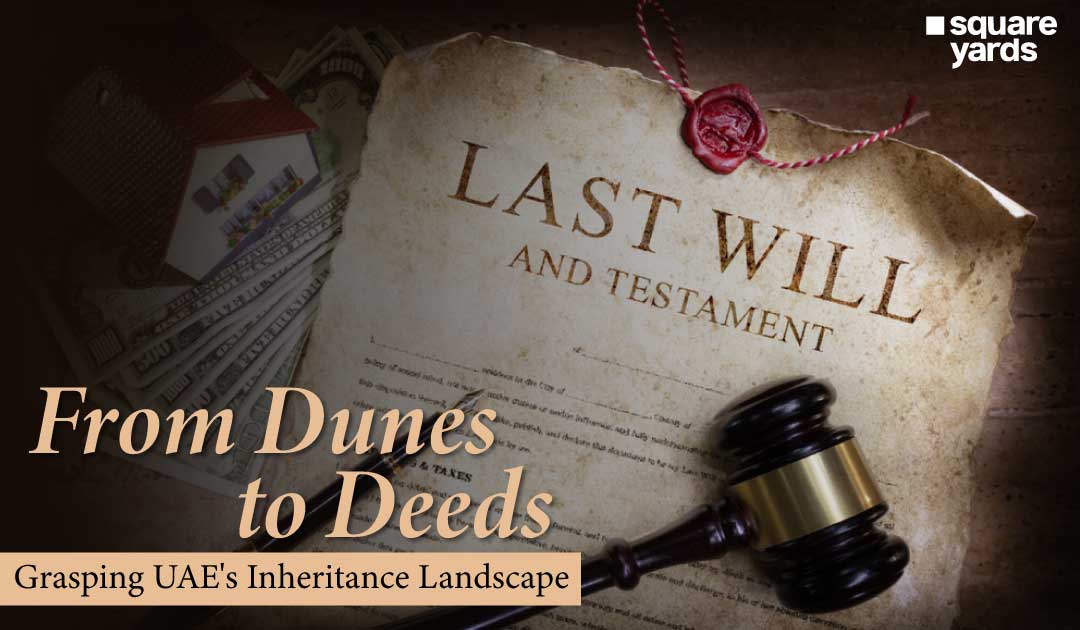As I sit here, sipping on a cup of tea, with the warm Emirati sun casting long shadows on our family home, I can’t help but think about the passage of time and the inevitable cycle of life. It’s a topic that might not be the most cheerful, but it’s one that we, as a family, need to discuss. Looking around the house you’ve called home for so many years will bring to mind exactly how your family would approach life were you not around. The inheritance law in UAE, like in other countries, enforce rules to ensure the safety of its people. This beautiful country has seen rapid growth and development over the years, with countless families in a place today where they can leave behind a legacy. The following blog highlights the importance of understanding inheritance law in UAE and provides a comprehensive overview of the procedures and their implementation. This knowledge is valuable not only for our family but also for countless others who may be wondering about the same concerns.
Inheritance: Definition and Meaning

The property you have worked so hard to acquire and maintain must be passed down to the next generations without any unnecessary hurdles. By understanding the legal framework surrounding UAE inheritance laws, you can make well-informed decisions to secure the future for all of you.
Inheritance in the United Arab Emirates is a matter of significant importance, as it defines the process by which property and assets are distributed among the rightful beneficiaries upon the owner’s passing. The legal framework for inheritance in the UAE is outlined in Article 313 of the UAE Personal Status Law of 2005. This law plays a crucial role in ensuring that the deceased’s assets are transferred to their designated heirs in a fair and organized manner. However, it’s important to note that the application of inheritance law in UAE depends on the presence or absence of a will.
When an individual passes away without leaving a will, the situation becomes particularly challenging for their surviving family members. In legal terms, this is referred to as dying “intestate.” Without a valid will in place, the deceased’s estate cannot be accessed, managed, or transferred without court orders. This can result in severe financial difficulties and lead to unreasonable delays in the inheritance process. To avoid these issues and to ensure a smoother transition of assets, individuals should create a will during their lifetime. This proactive step can spare their families from the emotional distress and financial burdens that may otherwise arise. If a will is available, the deceased’s assets are distributed under its provisions. Notably, a choice may include specific instructions regarding who should receive the support, and it can also exclude certain heirs, as per the deceased’s wishes. This underlines the importance of having a will that accurately reflects an individual’s intentions.
Navigating UAE Property Inheritance Rules
It’s also worth noting that the UAE’s inheritance laws differentiate between Muslims and non-Muslims. For Muslim inheritance, the rules are based on Islamic Sharia principles, which provide a structured framework for asset distribution based on familial relationships and the deceased’s circumstances. On the other hand, non-Muslim residents in the UAE have more flexibility. They can either choose to follow the inheritance laws of their home country if they are expatriates, or they can opt for the local UAE laws. Additionally, some provisions from the Civil Transactions Law of 1985 may also be applicable in certain situations.
-
Inheritance Insights: For Non-Muslims

When a non-Muslim resident passes away without leaving a will, their assets are allocated in a structured manner. Non-muslim inheritance is explained as follows:
-
- Half of the inheritance goes to the surviving spouse, and the other half is equally divided among the children.
- In the absence of children, 50% of the inheritance is allocated to the spouse, and the remaining 50% is divided evenly between the parents.
- If only one parent is living, half of the inheritance is bequeathed to the spouse, and the other half is divided into two equal parts: one for the living parent and the other for the deceased’s brothers.
- If there are no surviving parents, children, or brothers, all inheritance is granted to the living parent.
- Without parents, the entire inheritance is shared equally among the brothers.
Undertaken when the deceased has not left a will, Articles 11 and 12 ensure the rightful distribution of your property is carried out.
-
Inheritance Insights: For Muslims
Muslim inheritance law in the UAE works on Sharia. Sharia provisions governing inheritance are intricate and comprehensive, encompassing over 40 articles. However, certain considerations must be made when assessing the assets of a deceased Muslim before summarising these rules:
-
- Inheritance allocation occurs after covering funeral expenses and settling outstanding debts of the deceased.
- If the deceased left a will, assets are primarily distributed according to the will. Any remaining property will be divided following Sharia guidelines.
- The testator can bequeath up to one-third of their assets in the will, with specific limitations on beneficiaries.
- Without a will, assets are solely determined according to Sharia principles.
- Heirs are identified through the testimony of two male witnesses and supporting documentation.
- Non-Muslims are not eligible to inherit from a Muslim’s estate.
- Individuals who intentionally cause harm to another to benefit from their assets are not entitled to a share in the inheritance.
Understanding Forced Inheritance
UAE offers Article 321 to ensure that no family member is left destitute without an inheritance. This prevents the people from entirely emitting a family member as well. The rationale behind this concept is that it ensures that close family members receive at least a portion of the deceased’s assets. A detailed look at forced inheritance is below.
-
Forced Inheritance: Half Inheritance
Mandatory inheritance provisions dictate that under specific situations, particular individuals receive half the estate:
-
- If the wife has no offspring, the husband is entitled.
- If the deceased’s only child is a daughter, she is the beneficiary.
- Without direct offspring, the son’s daughter becomes the heir.
- If there are no siblings, progeny, father, or paternal grandfather, the full sister is the inheritor.
- Without a spouse, offspring, father, or paternal grandfather, the half-sister (on the father’s side) can inherit.
-
Forced Inheritance: One-Third Inheritance
If the deceased has no descendants, one-third of the inheritance will be distributed to:
-
- The mother provided there’s no sibling or descendant of the dead.
- Children from multiple mothers are divided equally without a descendant, father, or paternal grandfather.
- The paternal grandfather, when accompanied by more than two half-siblings, and where there aren’t any mandatory heirs.
-
Forced Inheritance: One-Fourth Inheritance

Under specific inheritance provisions, a one-fourth share is granted to:
-
- The husband when his wife possesses descendants.
- The wife, regardless of number, in the absence of descendants from the husband.
-
Forced Inheritance: One-Sixth Inheritance
Forced inheritance guidelines dictate a one-sixth share for the following individuals without descendants:
-
- The father or paternal grandparents.
- The mother, alongside descendants and siblings.
- Daughters from the son or his lineage if no direct son or grandson exists.
- Siblings with shared parents if neither the father nor the paternal grandfather is present.
Further breakdown
-
- The father, when joined by a descendant.
- The paternal grandfather, following Article 327(2).
- The mother, when accompanied by descendants or multiple siblings.
- Any living grandmother, unless excluded from inheritance.
- Daughters of the son or his lineage, prioritising if there’s no equal or higher-degree male heir.
- Half-sisters alongside full sisters without direct descendants, father, paternal grandfather, or brothers.
- The sole sibling with shared parents if there’s no father or paternal grandfather, as outlined in Article 347.
-
Forced Inheritance: One-Eighth Inheritance
- The wife, regardless of number, when the husband possesses a descendant.
-
Forced Inheritance: Two-Third Inheritance
The two-thirds inheritance is designated for:
-
- Multiple daughters when there’s no son from the deceased.
- Daughters from the son, without a spouse, offspring, or grandchildren.
- Full sisters, without descendants or any germane or half-brothers.
- Half-sisters (on the father’s side) when no descendants, germane or half-brothers are present.
Following forced inheritance allocations, any remaining estate will be distributed among other inheritors. If no inheritors exist, the assets revert to the forced heirs or, failing that, to the residual heirs. If none of these categories have representatives, the property will be shared among distant relatives. Should no such relatives be found, the government assumes ownership of the assets.
To, Sands and Heirlooms
Wrapping up inheritance law in UAE, you should know that life and death are inevitable. Knowing these terms will help you navigate this unavoidable fate better. In a country that has witnessed a rapid transformation over mere decades, the permanence of inheritance laws underscores the importance of family, lineage, and honouring those who came before. Deciphering the UAE’s inheritance framework can feel as intricate as the shifting desert sands. Yet, it is within this complexity that the essence of life’s cycle – birth, energy, and death – finds its reflection. While the spectre of mortality might loom as a shadow, the inheritance laws highlight the importance of preparation, legacy, and familial bonds.
Recommended for you :
|
Know The Mortgage Rates in UAE |
|
|
Explore Dubai Rental Market |
|
|
Some New Laws in UAE |
|
|
Overview of Tenancy Laws in Abu Dhabi |
Frequently Asked Questions (FAQs)
In the UAE, both nationals and expatriates can inherit property. However, the inheritance process and entitlements are governed by Sharia law for Emirati nationals. At the same time, expatriates can choose their home country's law or draft a will through the UAE's legal system.
When you die, properties are distributed based on your will, or if no choice exists, according to local inheritance laws. In many jurisdictions, the estate goes through a probate process to ensure lawful distribution to heirs or beneficiaries.
In the UAE, legal heirs typically include immediate family members such as spouses, children, and parents. The distribution of assets among these heirs is influenced by Sharia law, which prioritises male heirs and defines specific shares for family members.
In the UAE, property is divided among heirs based on Sharia law principles. These principles allocate specific shares to each heir, with male heirs typically receiving twice the percentage of female heirs. Spouses, children, and parents are primary beneficiaries, with exact allocations varying based on the deceased's family structure and relationships.
If the deceased has no will in the UAE, assets are distributed according to Sharia law. This means the estate is divided among legal heirs, such as the spouse, children, and parents, with specific shares defined by Islamic jurisprudence. Expatriates without a will might face complex legal scenarios, and their assets may also be subject to Sharia law distribution unless provisions from their home country are invoked.
A will outlines how your assets are distributed after death. To create one: Consult with a lawyer. List assets and designate beneficiaries. Get it witnessed and notarised. Periodically review and update.
Having a will offers control over how your assets are distributed after death. It can minimise potential disputes among family members, expedite the estate settlement process, and designate guardians for any minor children.
Inheriting property in the UAE involves several steps: verifying the deceased's will or applying Sharia law if no choice exists, obtaining a succession certificate from the court, settling any debts or liabilities, and then transferring the property's title to the rightful heirs as per the inheritance provisions. Who is entitled to inherit property in the UAE?
What happens to properties when you die?
Who are the legal heirs in the UAE?
How is property divided among heirs in the UAE?
What happens if the deceased does not have a will?
What is a will, and how do I make one?
What are the benefits of having a will?
What are the steps involved in inheriting property in the UAE?




